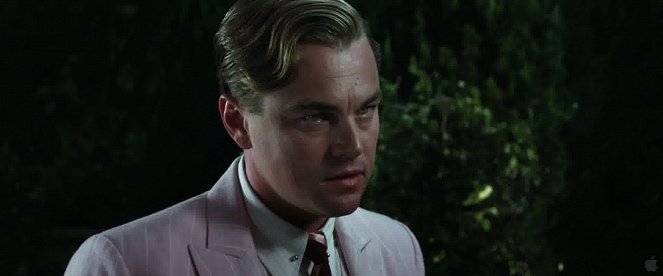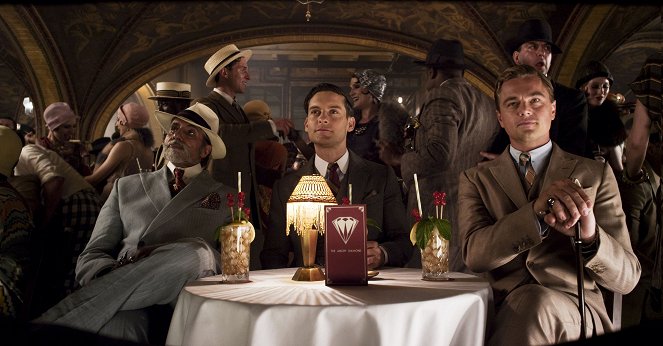Directed by:
Baz LuhrmannCinematography:
Simon DugganComposer:
Craig ArmstrongCast:
Leonardo DiCaprio, Tobey Maguire, Carey Mulligan, Joel Edgerton, Isla Fisher, Jason Clarke, Elizabeth Debicki, Jack Thompson, Amitabh Bachchan, Gemma Ward (more)VOD (4)
Plots(1)
Set in the 1920s, the story follows aspiring writer Nick Carraway (Maguire) as he moves to New York and becomes intrigued by his neighbour Jay Gatsby (DiCaprio)'s lavish lifestyle and mysterious past. As Nick finds himself caught up in the world of the wealthy, he witnesses romantic entanglement and betrayal. Gatsby's true nature is slowly exposed and his involvement with old flame Daisy Buchanan (Mulligan) ultimately leads to tragedy. (Warner Bros. UK)
(more)Videos (28)
Reviews (16)
The make-up and lighting make Gatsby look like a leaked Madame Tussaud model. Luhrmann's lust for the most effective imagery neuters the sketches of everyone else, making The Great Gatsby the most poorly narrated (and subjectively longest) blockbuster of the season; a good party ends without a hangover, but here you're dragged to the sidelines with a queasy stomach before its climax.
()
Two and a half stars for the soundtrack, which is not even properly used. The film itself didn’t do for me, but I will give it another chance after some time. The first time I watched it, it irritated me in a similar way as the beginning of Moulin Rouge! … But whereas Moulin Rouge got better as the story progressed, Gatsby irritated me throughout. Maybe next time.
()
The time arc of 1922/1929 (or richer, as the flashbacks chart Gatsby's entire life) did not disappoint. That's what I call a film that I experience inwardly. A formal and dramatic orgasm. The overall production design alone is perfection (this isn't just any 1920s movie, this is the exact 1920s that I live for). ___ The flawless soundtrack has me undulating to "Young and Beautiful" (Lana del Rey), "Love is Blindness" (Jack White), and the searing "Bang Bang" (Will.i.am).
()
From the first pages of the book, I knew that The Great Gatsby was the perfect material for Baz Luhrmann. And for me, as a person who 12 years ago couldn't catch a breath during the audiovisual musical version of Paris, the first half is a dream that I thought would never come true. A naive narrator, a perfect modern soundtrack, and captivating camera tricks that made me want to melt into the screen and stay there forever. Luhrmann simply knows what he's good at, and when his characteristic (sometimes almost carbon copied) narrative tricks are supported by the noble Leonardo DiCaprio, there is no doubt that the words "The Great" in the title are fully deserved. I am disappointed with the last act of the story just like I was with the book; F. Scott Fitzgerald stumbled a bit with the ending. And while it became somewhat bitter in places in light of the greater emphasis on the societal aspect, Luhrmann does not deviate from the opulent form for a moment. His storytelling is not a general social warning, but rather cautiously interhuman on a much smaller scale. And this more restrained approach far more aptly fits the story of love that was worth all the effort and suffering.
()
What part of it makes us more crazy? That, according to Luhrmann, Fitzgerald is a superficial mannerist from the garrulous red library? That the 1920s look like a forgettable industrial dystopia mixed with the extravaganza of a lifestyle magazine? That the "glamor" aesthetic of the film is so ostentatious that it is annoying? That the characters are without exception flat and the most superficial is, coincidentally, the narrator? That the film has a totally nonsensical dramatic construction? That there is nothing left of the elegance and decadence of the "before the great fall" epoch but a flood of confetti and digital sterility? I don't even know and I really didn't care after a few minutes. A silly experience that is best described to me by Rex Reed's words: "This is one of the most maddening examples of wasted money ever dumped on the screen".
()



Ads